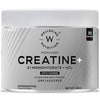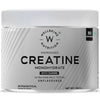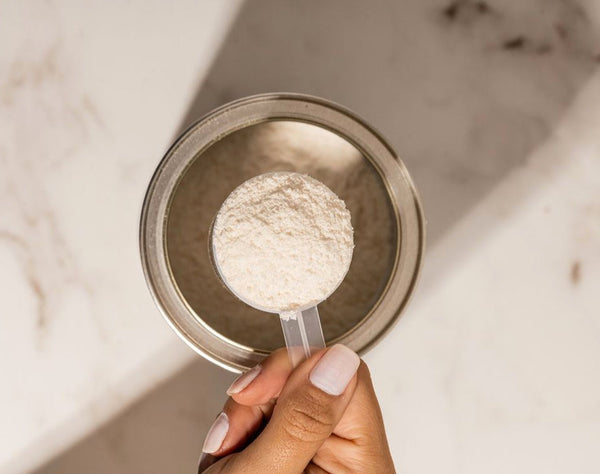Creatine is often associated with building strength and improving athletic performance, but did you know it offers a range of health benefits beyond the gym? As one of the most researched supplements, creatine has proven itself time and again in both physical and cognitive health. In this blog, we’ll explore 15 science-backed benefits of creatine to show why it’s a staple for athletes, fitness enthusiasts, and even non-athletes.
What is Creatine?
Creatine is a natural compound stored in your muscles and brain that helps produce ATP, the primary energy source for your body. While creatine is found in foods like red meat and fish, supplementation ensures optimal levels to support various bodily functions.
Health and Performance Benefits of Creatine
1. Improves Muscle Strength
Creatine enhances your muscles' ability to produce energy during high-intensity workouts. Over time, this results in increased strength and power, making it especially beneficial for resistance training and weightlifting enthusiasts.
2. Boosts Exercise Performance
By replenishing ATP (adenosine triphosphate) stores, creatine allows you to push harder and sustain peak performance during short bursts of intense activity, such as sprinting, jumping, or heavy lifting.
3. Accelerates Recovery
Creatine helps reduce muscle cell damage and inflammation caused by strenuous exercise. This speeds up the recovery process, allowing you to get back to your workouts faster and with less soreness.
4. Increases Muscle Mass
Creatine enhances water retention in muscle cells, which increases their volume and gives them a fuller appearance. Over time, this contributes to actual muscle growth when paired with a consistent training routine.
5. Enhances Brain Function
Creatine isn’t just for muscles—it also benefits the brain. It improves cognitive functions like memory, focus, and mental clarity, particularly during tasks that require sustained effort or quick decision-making.
6. Reduces Fatigue
Creatine helps delay both mental and physical fatigue by ensuring a steady supply of energy. This means you can perform better during prolonged workouts and stay sharper during mentally demanding tasks.
7. Supports Bone Health
Emerging research suggests that creatine may improve bone mineral density, which is crucial for reducing the risk of fractures and maintaining skeletal strength, particularly as you age.
8. Aids in Neuroprotection
Creatine has shown potential in protecting brain cells against damage caused by conditions like Parkinson’s and Alzheimer’s. By enhancing cellular energy, it supports brain health and resilience.
9. Improves Sprint Performance
Athletes in sports that involve quick, explosive movements—like sprinting or football—can benefit significantly from creatine supplementation. It boosts energy availability for short, high-intensity efforts.
10. Helps with Muscle Recovery in Aging Adults
For older adults, creatine supplementation helps combat muscle loss (sarcopenia) by preserving muscle strength and function. This leads to better mobility and overall quality of life as you age.
11. Supports Heart Health
By improving the production of cellular energy and reducing oxidative stress, creatine may have a protective effect on the heart. It helps maintain healthy blood flow and supports overall cardiovascular health.
12. Aids in Rehabilitation
Creatine is beneficial for those recovering from injuries or surgeries. It promotes faster muscle repair, reduces inflammation, and helps rebuild strength during the rehabilitation process.
13. Improves Endurance in High-Intensity Sports
While creatine is best known for strength sports, it also benefits endurance athletes by enhancing performance in activities that require repeated bursts of high-intensity effort, such as soccer or interval training.
14. Regulates Blood Sugar Levels
Studies suggest that creatine can improve glucose uptake by muscle cells, which helps regulate blood sugar levels. This can be particularly helpful for those managing diabetes or metabolic health issues.
15. Safe and Effective Long-Term Use
Unlike many supplements, creatine has been extensively studied and shown to be safe for long-term use. Its benefits extend beyond muscle performance, making it a reliable addition to your health routine.
Who Can Benefit from Creatine?
1. Athletes Looking to Improve Performance
Creatine is a game-changer for athletes in high-intensity sports like weightlifting, sprinting, or football. By boosting energy production and muscle strength, it helps athletes push their limits and improve overall performance.
2. Fitness Enthusiasts Aiming for Muscle Growth and Recovery
Whether you’re a gym-goer looking to gain muscle mass or someone focused on quicker recovery, creatine can be a valuable addition to your fitness routine. It supports muscle repair and enhances growth when paired with consistent training.
3. Older Adults Wanting to Preserve Muscle and Cognitive Function
Aging often leads to muscle loss and cognitive decline. Creatine helps combat these issues by preserving muscle mass and improving memory, focus, and brain health, making it a great supplement for maintaining vitality in later years.
4. Those with Neurological Conditions Exploring Therapeutic Options
Creatine shows promise as a neuroprotective agent, helping individuals with conditions like Parkinson’s or Alzheimer’s. By improving cellular energy, it supports brain function and may slow down the progression of these diseases.
Creatine is far more than just a fitness supplement. From improving strength and stamina to supporting brain health and recovery, its benefits extend to people from all walks of life. Whether you’re an athlete or someone looking to enhance your overall health, creatine is a well-researched, effective option worth considering.
Remember, consistent use and a balanced diet are key to unlocking the full potential of creatine.



























